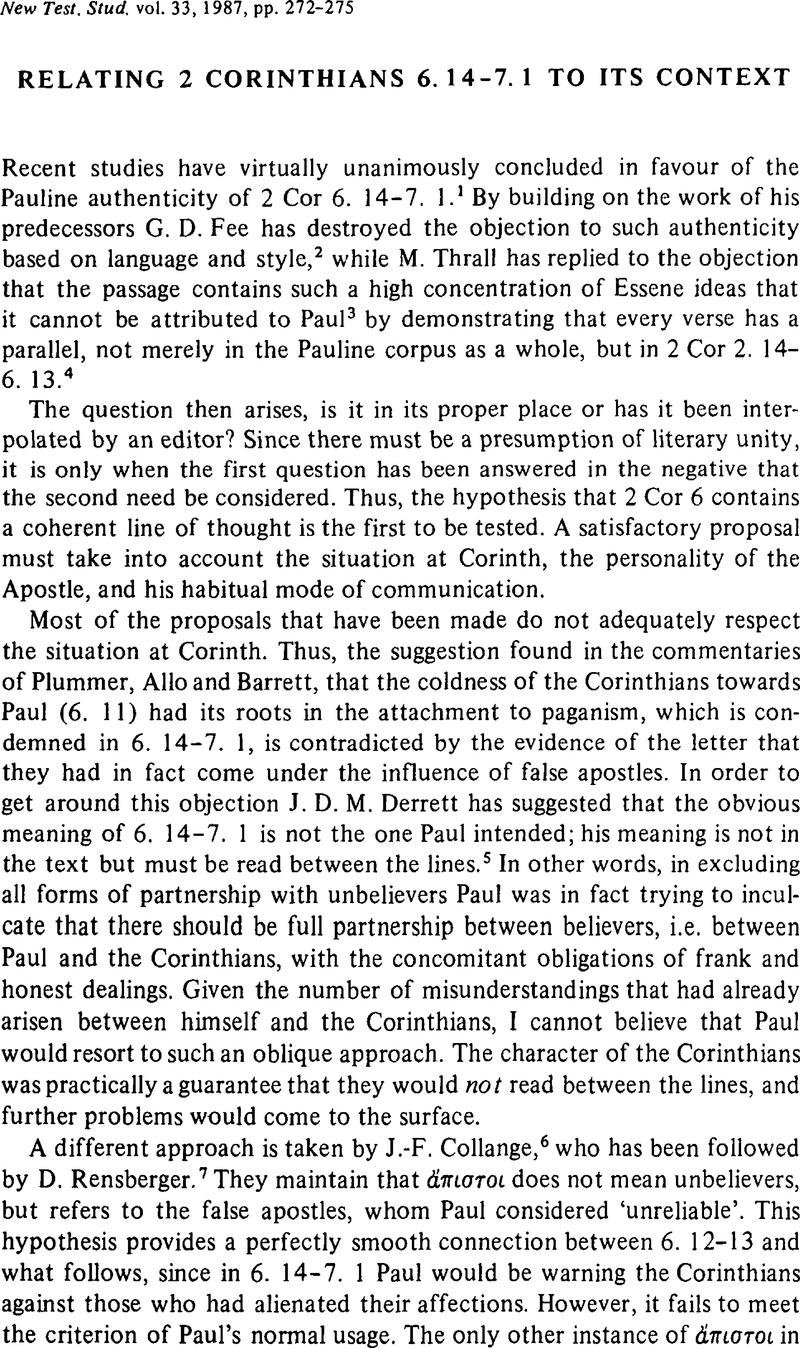Article contents
Relating 2 Corinthians 6.14–7.1 to its Context
Published online by Cambridge University Press: 05 February 2009
Abstract

- Type
- Short Studies
- Information
- Copyright
- Copyright © Cambridge University Press 1987
References
NOTES
[1] The one exception is Betz, H. D., ‘2 Cor 6:14–7:1: An Anti-Pauline Fragment?’ JBL 92 (1973) 88–108.Google Scholar
[2] ‘II Corinthians VI.14–VII.1 and Food offered to Idols’, NTS 23 (1977) 144–7.Google Scholar
[3] Fitzmyer, J. A., ‘Qumran and the Interpolated Paragraph in 2 Cor 6:14–7:1’, CBQ 23 (1961) 271–80Google Scholar; J. Gnilka, ‘2 Cor 6:14–7:1 in the Light of the Qumran Texts and the Testaments of the Twelve Patriarchs' in Paul and Qumran, ed. Murphy-O'Connor, J. (London, 1968) 48–68.Google Scholar
[4] ‘The Problem of II Cor. VI.14–VII.1 in Some Recent Discussion’, NTS (1978) 132–48.Google Scholar
[5] ‘2 Cor 6,14ff. a Midrash on Dt 22, 10’, Biblica 59 (1978) 231–50.Google Scholar
[6] Enigmes de la deuxième épître de Paul aux Corinthiens. Etude exégétique de 2 Cor. 2, 14–7, 4 (SNTSMS, 18, Cambridge, 1972) 305–6.Google Scholar
[7] ‘2 Corinthians 6:14–7:1 –A Fresh Examination’, Studia Biblica et Theologica 8 (1978) 25–49.Google Scholar
[8] The thesis of Betz (note 1) rests on the identification of ἄπιστοι with Gentile Christians. As Thrall (art. cit., p. 148 note 1) has shown, this is completely without foundation.
[9] Art. cit. (note 4) 143.
[10] Der zweite Korintherbrief (Göttingen, 1924) 218.Google Scholar
[11] Art. cit. (note 4) 144.
[12] Art. cit. (note 4) 146.
[13] Thomson, C., The Septuagint Bible, as edited, revised and enlarged by Muses, C. A. (Indian Hills, 1954) 313.Google Scholar
[14] See Mealand, D. L., ‘“As having nothing, and yet possessing everything” 2 Kor 6.10c’, ZNW 67 (1976) 276–9.Google Scholar
[15] ‘Glory Reflected on the Face of Christ (2 Cor 3:7–4:6) and a Palestinian Jewish Motif’, TS 42 (1981) 633–9.Google Scholar
- 1
- Cited by


